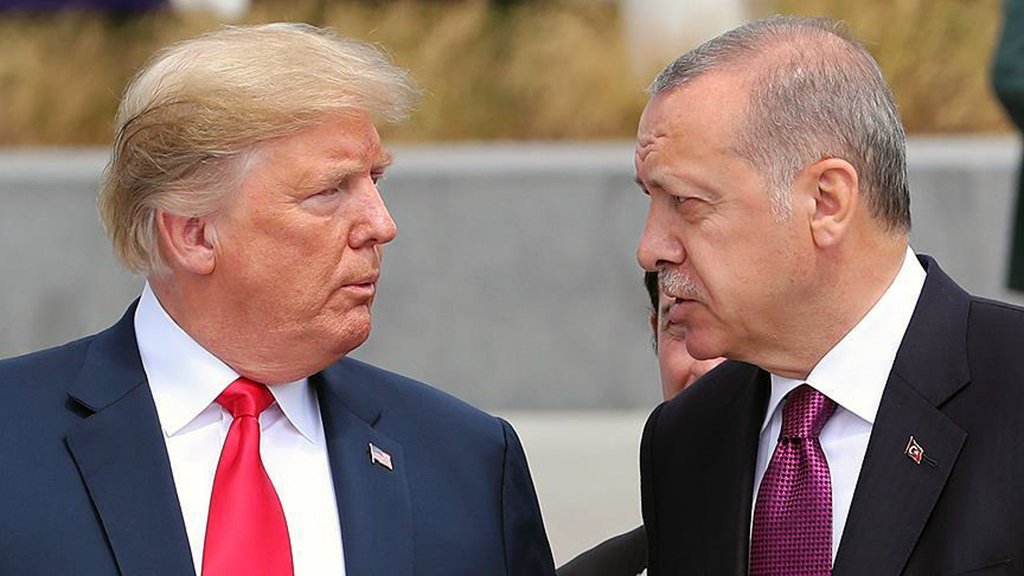
Erdoğan's moral politics vs. Trump's realpolitik
During the 74th session of the United Nations General Assembly on Sept. 17, two speeches grabbed the world's attention. The first one was by U.S. President Donald Trump, the other speech was delivered by President Recep Tayyip Erdoğan. These two speeches reflected two opposite political perspectives.
Share
During the 74th session of the United Nations General Assembly on Sept. 17, two speeches grabbed the world's attention. The first one was by U.S. President Donald Trump, the other speech was delivered by President Recep Tayyip Erdoğan. These two speeches reflected two opposite political perspectives.
While Trump's speech mainly focused on realpolitik and interpreted global political developments from an ultranationalistic perspective and called the world to be more nationalistic, President Erdoğan drew the attention of the world public opinion to the global injustice and malfunctioning global system.
At the beginning of his speech, Trump declared that "the future does not belong to globalists. The future belongs to patriots. The future belongs to sovereign and independent nations…" However, in the latter part of the speech, he threatened some countries who do not follow pro-American policies such as Iran, China and Venezuela.
Trump repeatedly emphasized national culture, national history, national values; rather than universal values, multiculturalism and diversification. He invited other world leaders to follow the footsteps of his administration. He called others to lift up their nations, to cherish their culture, to honor their histories, to treasure their citizens, to make their countries strong, and prosperous, and righteous. In other words, he encouraged other states to pursue an ultranationalist, autarchic, and conflictual relations. Trump reads world politics with power competition.
On the other hand, President Erdoğan delivered his speech not only as the president of Turkey, but also as a global leader and as one of the representatives of the unrepresented and ignored states and peoples. He strongly emphasized the global injustice and inequality, and pointed out that global injustice is the main source of political instability, chaos, conflictual relations, economic crises, terrorism, poverty, hunger and climate change.
Erdoğan also mentioned that if one side is not secure, the other side cannot remain secure. For Erdoğan, the fate of humanity cannot be left to the authority of some states only. Therefore, the world is bigger than five. He proposed to change the structure of the U.N. Security Council to make it more inclusive and more representative. This will require the contribution of other global and regional countries to the maintenance of the global system and the functioning international regimes such as human rights and international trade.
Erdoğan questioned the double standards of some global powers regarding both regional and global problems. Nuclear powers have been using the nuclear proliferation as an excuse to intervene into the affairs of other states.
Erdoğan called the anti-Iranian global powers to provide reasoning for their policy. Indirectly, he implied that the imposition of sanctions against Iran are baseless and are not followed on rational ground. Those who try to punish Iran for its conflictual policies remain silent for drastic violations of basic human rights in the Middle East. The U.S. and other Western countries generally remain silent for the illegal and inhumane Israeli policies in Palestine, the killing of the Saudi journalist Jamal Khashoggi and the death of Muhammed Morsi, the only elected Egyptian president. When giving these examples, President Erdoğan emphasized the ineffectiveness of the U.N.
President Erdoğan not only criticized the global system, but also offered concrete proposals for political reform. For instance, he called to take necessary measures for environmental protection, the resolution of the Syrian crisis, the struggle against all terrorist groups and to manage migration waves.
Both leaders want a global transformation, but for different reasons and with different expectations. While Trump wants a more exclusive global system, Erdoğan asks for a more inclusive global system. That is, no global and regional power is satisfied with the global system, but each want to transform the system according their national interests, which are mainly conflictual.
[Daily Sabah, 2 October 2019]
Tags »
Related Articles








